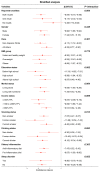Association of Physical Activity with Phenotypic Age among Populations with Different Breakfast Habits
- PMID: 38474704
- PMCID: PMC10934488
- DOI: 10.3390/nu16050575
Association of Physical Activity with Phenotypic Age among Populations with Different Breakfast Habits
Abstract
Background: The global aging situation has reached a serious stage, and healthy lifestyles, like regular physical activity and eating breakfast, could slow the process. Phenotypic age (PhenoAge) is regarded as a novel measure of aging. Therefore, our study aimed to quantify the impact of physical activity and eating breakfast on aging via PhenoAge and phenotypic age acceleration (PhenoAgeAccel).
Methods: A total of 3719 adults who participated in the National Health and Nutrition Examination Survey were involved in this study. Physical activity was divided into an active group and an inactive group. According to the number of reported breakfast recalls, eating breakfast was divided into the no recalls group, one recall group, and both recalls group. Sensitivity analysis was performed by stratified analysis.
Results: Active physical activity was a protective factor for PhenoAge and PhenoAgeAccel. Compared to the inactive group, the β values of the active group were -8.36 (-10.09, -6.62) for PhenoAge and -1.67 (-2.21, -1.14) for PhenoAgeAccel. The stratified analysis results showed that in the groups reporting breakfast in both recalls, one recall, and no recalls, the β values of the active group were -8.84 (-10.70, -6.98), -8.17 (-12.34, -4.00), and -3.46 (-7.74, 0.82), respectively, compared to the inactive group.
Conclusions: Active physical activity was strongly correlated with lower values of PhenoAge and PhenoAgeAccel, but the association was no longer statistically significant when combined with not regularly eating breakfast.
Keywords: aging; eating breakfast; inflammation; phenotypic age; physical activity.
Conflict of interest statement
The authors declare that there are no conflicts of interest regarding the publication of this paper.
Figures


Similar articles
-
Associations of combined phenotypic aging and genetic risk with incident cancer: A prospective cohort study.Elife. 2024 Apr 30;13:RP91101. doi: 10.7554/eLife.91101. Elife. 2024. PMID: 38687190 Free PMC article.
-
Association Between Phenotypic Age and the Risk of Mortality in Patients With Heart Failure: A Retrospective Cohort Study.Clin Cardiol. 2024 Aug;47(8):e24321. doi: 10.1002/clc.24321. Clin Cardiol. 2024. PMID: 39114957 Free PMC article.
-
The Mediating Role of Dietary Inflammatory Index in the Association between Eating Breakfast and Obesity: A Cross-Sectional Study.Nutrients. 2022 Oct 19;14(20):4378. doi: 10.3390/nu14204378. Nutrients. 2022. PMID: 36297064 Free PMC article.
-
Associations of sleeping, sedentary and physical activity with phenotypic age acceleration: a cross-sectional isotemporal substitution model.BMC Geriatr. 2023 Mar 23;23(1):165. doi: 10.1186/s12877-023-03874-6. BMC Geriatr. 2023. PMID: 36959562 Free PMC article.
-
Accelerated biological aging in patients with degenerative spine diseases: the impact of modifiable lifestyle factors on phenotypic age.Spine J. 2025 Apr 5:S1529-9430(25)00181-0. doi: 10.1016/j.spinee.2025.04.001. Online ahead of print. Spine J. 2025. PMID: 40194711
Cited by
-
Association of longitudinal body mass index trajectories with phenotypic age acceleration: a cross-sectional study based on growth mixture modeling.Geroscience. 2025 May 1. doi: 10.1007/s11357-025-01681-y. Online ahead of print. Geroscience. 2025. PMID: 40307654
-
Associations of lung function impairment and biological aging with mortality and cardiovascular disease incidence: findings from UK biobank participants.Front Public Health. 2025 Jul 10;13:1635195. doi: 10.3389/fpubh.2025.1635195. eCollection 2025. Front Public Health. 2025. PMID: 40709038 Free PMC article.
-
Exploring the impact of women-specific reproductive factors on phenotypic aging and the role of life's essential 8.Nutr J. 2024 Aug 20;23(1):96. doi: 10.1186/s12937-024-00999-1. Nutr J. 2024. PMID: 39160526 Free PMC article.
-
Sedentary behavior accelerates biological aging mediated by body mass index in adults.Sci Rep. 2025 Jul 1;15(1):21356. doi: 10.1038/s41598-025-06325-x. Sci Rep. 2025. PMID: 40594876 Free PMC article.
References
-
- Nations T.U. World Social Report 2023. United Nations; New York, NY, USA: 2023.
-
- Yang Z., Pu F., Cao X., Li X., Sun S., Zhang J., Chen C., Han L., Yang Y., Wang W., et al. Does healthy lifestyle attenuate the detrimental effects of urinary polycyclic aromatic hydrocarbons on phenotypic aging? An analysis from NHANES 2001–2010. Ecotoxicol. Environ. Saf. 2022;237:113542. doi: 10.1016/j.ecoenv.2022.113542. - DOI - PubMed
MeSH terms
LinkOut - more resources
Full Text Sources
Medical

